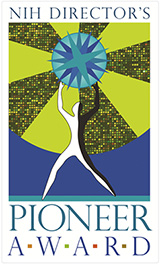2006 Awardees

Kwabena A. Boahen, Ph.D.
Stanford University
Project Title: NIH Director's Pioneer Award
Grant ID: OD000965
Kwabena A. Boahen, Ph.D., is an associate professor of bioengineering at Stanford University. He received a Ph.D. in computation and neural systems from the California Institute of Technology in 1997. Boahen is a bioengineer who is using silicon-integrated circuits to emulate the way neurons compute, linking the seemingly disparate fields of electronics and computer science with neurobiology and medicine. His “neuromorphic” chips – including a silicon retina that could be used to give the blind sight – were the subject of a Scientific American cover story in May 2005. Boahen is using his Pioneer Award to develop Neurogrid, a specialized hardware platform to enable the inner workings of the brain’s cortex to be simulated in detail – something outside the reach of even the fastest supercomputers. His honors include a Packard Foundation Fellowship and a National Science Foundation CAREER Award.

Arup K. Chakraborty, Ph.D.
Massachusetts Institute of Technology
Project Title: NIH Director's Pioneer Award
Grant ID: OD001022
Arup K. Chakraborty, Ph.D., is the Robert T. Haslam Professor of Chemical Engineering, Chemistry, and Biological Engineering at the Massachusetts Institute of Technology. He received a Ph.D. in chemical engineering from the University of Delaware in 1988. Chakraborty’s early work focused on the development and application of quantum and statistical mechanical approaches to the study of polymers and catalysts. Since 2000, his research has been focused on immunology. Chakraborty has shown that theoretical methods rooted in physics and engineering can complement biological experiments (with collaborators) to understand how T lymphocytes communicate with other cells and detect the presence of minute amounts of antigen. With his Pioneer Award, he is using related approaches to develop the principles that govern the emergence of autoimmune diseases. A member of the National Academy of Engineering, Chakraborty has also been recognized with the Allan P. Colburn and Professional Progress awards from the American Institute of Chemical Engineers, a Camille Dreyfus Teacher-Scholar Award, and a National Science Foundation Young Investigator Award.

Lila M. Gierasch, Ph.D.
University of Massachusetts, Amherst
Project Title: NIH Director's Pioneer Award
Grant ID: OD000945
Lila M. Gierasch, Ph.D., is Distinguished Professor of Biochemistry and Molecular Biology and Chemistry at the University of Massachusetts, Amherst. She received a Ph.D. in biophysics from Harvard University in 1975. Gierasch’s research focuses on protein folding and protein-peptide interactions. She is using her Pioneer Award to develop new ways to observe the process of protein folding in vivo. This work will provide fundamental knowledge needed to understand diseases associated with protein misfolding. Gierasch’s honors include the Vincent du Vigneaud Award from the American Peptide Society, a D.Sc. honoris causa from Mount Holyoke College, and the Garvan-Olin Medal from the American Chemical Society. She has served on the National Advisory General Medical Sciences Council at the National Institutes of Health as well as on the Advisory Committee for the National Science Foundation Directorate for Mathematical and Physical Sciences.

Rebecca W. Heald, Ph.D.
University of California, Berkeley
Project Title: NIH Director's Pioneer Award
Grant ID: OD000818
Rebecca W. Heald, Ph.D., is an associate professor of molecular and cell biology at the University of California, Berkeley. She received a Ph.D. in cell physiology from Harvard Medical School in 1993. Heald has done groundbreaking research on the mechanisms of cell division, focusing on the mitotic spindle apparatus, which functions to segregate duplicated chromosomes equally to the two daughter cells. She is using her Pioneer Award to study how cells determine the size of their component organelles, such as the spindle. Heald is a monitoring editor for the Journal of Cell Biology. She was the 2005 recipient of the Women in Cell Biology Career Recognition Award from the American Society for Cell Biology.

Karla Kirkegaard, Ph.D.
Stanford University School of Medicine
Project Title: NIH Director's Pioneer Award
Grant ID: OD000827
Karla Kirkegaard, Ph.D., is professor and chair of the Department of Microbiology and Immunology at Stanford University School of Medicine. She received a Ph.D. in biochemistry and molecular biology from Harvard University in 1983. Kirkegaard has combined her interests in biochemistry, cell biology, and genetics to develop an approach to guide the selection of antiviral targets, with the goal of suppressing the drug-resistant RNA genomes that will inevitably be formed due to the high error rates of RNA replication. She is using her Pioneer Award to pursue the identification of dominant drug targets for the RNA genomes of the hepatitis C, polio, West Nile, and Dengue viruses. She is also quantifying the extent to which antiviral compounds targeted at the identified molecules suppress drug-resistant variant growth. Kirkegaard’s honors include a fellowship from the David and Lucile Packard Foundation, a Searle Scholar Award, and an Ellison Foundation Senior Scholar Award in Global Infectious Disease.
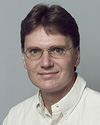
Thomas J. Kodadek, Ph.D.
Scripps Research Institute, Florida
Project Title: Novel Chemistry to Monitor and Manipulate the Immune System
Grant ID: OD000663
Thomas J. Kodadek, Ph.D., is a professor of Chemistry & Cancer Biology at the Scripps Research Institute in Jupiter, FL. Kodadek received a Ph.D. in organic chemistry in 1985 from Stanford University. His research focuses on the novel roles of the proteasome in gene expression, the role of the neurohormone orexin in various biological processes and the development of new proteomic technologies. Kodadek is using his Pioneer Award to develop a chemistry-based approach to monitor and manipulate the immune system.
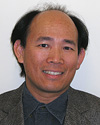
Cheng Chi Lee, Ph.D.
University of Texas Health Science Center at Houston
Project Title: NIH Director's Pioneer Award
Grant ID: OD000895
Cheng Chi Lee, Ph.D., is an associate professor of biochemistry and molecular biology at the University of Texas Health Science Center at Houston. He earned a Ph.D. in biochemistry in 1986 from the University of Otago, New Zealand. Early in his career, Lee developed novel technology for gene cloning. During the last decade, he has carried out innovative research on the identification of genes and their roles in regulating circadian rhythm in mammals. Recently, he identified an end product of metabolism that acts as a regulator of torpor, a mammalian hypothermic behavior. Lee is using his Pioneer Award to investigate the biological processes of suspended animation that are analogous to severe hypothermia in non- hibernating mammals. This work could have many medical applications.
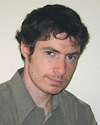
Evgeny A. Nudler, Ph.D.
New York University School of Medicine
Project Title: NIH Director's Pioneer Award
Grant ID: OD000799
Evgeny Nudler, Ph.D., is a professor of biochemistry at the New York University School of Medicine. He received a Ph.D. in biochemistry in 1995 from the Institute of Molecular Genetics in Moscow, Russia. Nudler has done pioneering studies in various biological fields. His original work on transcription explained how RNA polymerase moves and recognizes pausing and termination signals in DNA and RNA. His studies on bacterial gene regulation led to the discovery of riboswitches (metabolite- sensing RNA) that control more than 3 percent of all bacterial genes. More recently, his group uncovered key regulators of the heat shock response in eukaryotic cells. Nudler has also made important contributions in the area of nitric oxide biochemistry in both animal and bacterial systems. He is using his Pioneer Award to develop conceptually new approaches to treat and prevent infectious diseases. Among Nudler’s honors are a Searle Scholar Award and an Edward Mallinckrodt, Jr. Foundation Award.
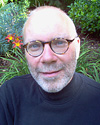
Gary J. Pielak, Ph.D.
University of North Carolina at Chapel Hill
Project Title: NIH Director's Pioneer Award
Grant ID: OD000783
Gary J. Pielak, Ph.D., is a professor of chemistry and a professor of biochemistry and biophysics at the University of North Carolina at Chapel Hill. He also directs the UNC Macromolecular Interactions Facility and co-directs the UNC Biomolecular NMR Facility. Pielak earned a Ph.D. in biochemistry from Washington State University in 1983. He has done pioneering research in protein engineering, biological electron transfer, and protein thermodynamics. He is using his Pioneer Award to study proteins involved in neurodegenerative diseases at the atomic level inside living cells. Pielak’s honors include a DuPont Young Faculty Award and an Underwood Fund Award.
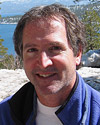
David A. Relman, M.D.
Stanford University
Project Title: NIH Director's Pioneer Award
Grant ID: OD000964
David A. Relman, M.D., is an associate professor of microbiology and immunology and of medicine at Stanford University. He is also chief of infectious diseases at the Veterans Affairs Palo Alto Health Care System. Relman received an M.D. in 1982 from Harvard Medical School. He has made significant contributions in the areas of microbial pathogen discovery and host-microbe interactions, including the identification of microbial causes for several important human diseases. He is using his Pioneer Award to characterize the microbial communities indigenous to humans and understand the roles of these communities in health and disease. Relman is a fellow of the American Academy of Microbiology, a member of the Forum on Microbial Threats of the Institute of Medicine, and a member of the National Science Advisory Board for Biosecurity.
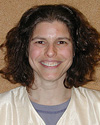
Rosalind A. Segal, M.D., Ph.D.
Dana-Farber Cancer Institute
Project Title: NIH Director's Pioneer Award
Grant ID: OD000839
Rosalind A. Segal, M.D., Ph.D., is a professor of neurobiology at Harvard Medical School and Ted Williams Senior Investigator, Departments of Cancer Biology and Pediatric Oncology at the Dana-Farber Cancer Institute. Segal received a Ph.D. in cell biology from Rockefeller University in 1985 and an M.D. from Cornell University Medical College in 1986. Her laboratory focuses on the biology of brain tumors by probing the complex molecular machinery of the developing brain. Segal’s research aims to understand the mechanisms critical for normal development of the nervous system and how deregulated proliferation, migration, and survival of cells can cause brain tumors and other neurological diseases. She is using her Pioneer Award for genetic and biochemical studies to identify the way complex sugars work to maintain neural stem cells in the developing and adult brain. Her prior honors include the Klingenstein Fund Robert Ebert Fellowship and a fellowship from the Claudia Adams Barr Program in Innovative Basic Cancer Research.
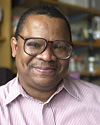
James L. Sherley, M.D., Ph.D.
Boston Biomedical Research Institute
Project Title: NIH Director's Pioneer Award
Grant ID: OD000805
James L. Sherley, M.D., Ph.D., is a senior scientist in the programs in regenerative biology and cancer at the Boston Biomedical Research Institute. He earned an M.D. and a Ph.D. in molecular biology from the Johns Hopkins University School of Medicine in 1988. Sherley’s research focuses on elucidating mechanisms responsible for the specialized renewal properties of adult stem cells and using this knowledge to address major research problems limiting the development of adult stem cells for biomedicine. These problems include producing large numbers of adult stem cells for research and development. Sherley is using his Pioneer Award to enable a new era of cellular medicine by developing routine methods for the production of several types of human adult stem cells with clinical potential. His honors include an award from the Pew Scholars Program in the Biomedical Sciences, selection for the Pew Science and Society Institute, and the Ellison Medical Foundation Senior Scholar Award in Aging.

Younan Xia, Ph.D.
Washington University in St. Louis
Project Title: NIH Director's Pioneer Award
Grant ID: OD000798
Younan Xia, Ph.D., is a professor of biomedical engineering at Washington University in St. Louis. He received a Ph.D. in physical chemistry from Harvard University in 1996. Xia is best known for the co-invention of soft lithography with Harvard professor George M. Whitesides, Ph.D., and the development of many methods for the controlled synthesis of nanomaterials. He has also done pioneering research to understand and manipulate the evolution pathways from atoms to nanocrystals. Xia is using his Pioneer Award to develop new tools for studying complex biological systems by harnessing the power of nanomaterials. His honors include a Baekeland Award from the American Chemical Society North Jersey Section, a Camille Dreyfus Teacher-Scholar Award, a Packard Fellowship, a National Science Foundation CAREER Award, a Sloan Research Fellowship, an American Chemical Society Victor K. LaMer Award, and a Dreyfus Foundation New Faculty Award.


